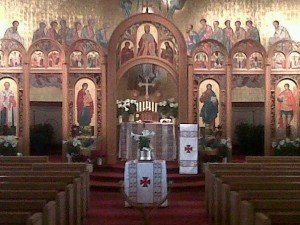 The eight-day period from Easter to the Anti-Pascha (St. Thomas Day), as many may already know, is called Bright Week. This entire period is considered by our Church to be one continuous day. Each day a different Tone is used (the set of eight tones that we use every weekend of the year is called the Octoechos). During this period the iconostas, by tradition, remains open, the only time of the year that this occurs. The open doors remind us that Christ revealed, by His resurrection, that we have access to eternity.
The eight-day period from Easter to the Anti-Pascha (St. Thomas Day), as many may already know, is called Bright Week. This entire period is considered by our Church to be one continuous day. Each day a different Tone is used (the set of eight tones that we use every weekend of the year is called the Octoechos). During this period the iconostas, by tradition, remains open, the only time of the year that this occurs. The open doors remind us that Christ revealed, by His resurrection, that we have access to eternity.
With our celebration of the Anti-Pascha, Sundays become, for the next forty days, the first day of the week. After Pentecost Sundays are considered to be the last day of the week.
Since the Resurrection of the Lord is the greatest and most important and beyond all thought, it is rededicated not only once a year but also on every eighth day. The first rededication of the Resurrection is this weekend for it is truly both the eighth day and the first. It is the eighth day after Pascha and the first day, because it is the beginning of the other days. Again, it is called the eighth day because it prefigures the unending day of the future age to come, which will be truly the first day and a day that is not divided by a single night. This is why we call this eight day Anti-Pascha, which interpreted means in the place of Pascha. We should also know that due to the honor given Sunday by the Lord’s Resurrection, the early Church began the tradition of transferring the weekly day of rest, that is the Jewish Sabbath which is Saturday, to this most honored day. The Eastern Church still liturgically observes Saturdays as special.
During this forty day period the Holy Shroud (Epitaphios in Greek and Plashchanitza in Old Slavonic) remains on the Holy Table and the Divine Liturgy is celebrated on top of it. It is then removed on Ascension Thursday to remind us of Christ’s ascension to the Father.
Normally, the entire Psalter is read during the course of a week and twice a week during the Great Fast. No psalms are read during the entire Bright Week and ordinary fasting is suspended.
Also during this forty-day period, the Easter Tropar is sung three times at the beginning and end of each service and also in place of other hymns. The great amount of repetition of this Tropar tells us that the resurrection of Christ is truly wonderful news to mankind and can never be declared often enough.
